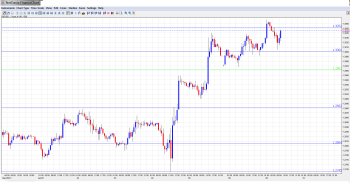EUR/USD continues to trade above the 1.30 level in Tuesday trading. The markets are pleased as the week has started with some solid releases out of Germany. On Tuesday, German Trade Balance came in above the estimate. It is another quiet day over in the US, with only two third-tier releases on the schedule.
Here is a quick update on the technical situation, indicators, and market sentiment that moves euro/dollar.
EUR/USD Technical
- Asian session: Euro/dollar showed some movement, reaching a high of 1.3069 before consolidating at 1.3021. The pair is steady in the European session.
- Current range: 1.30 to 1.3050.
Further levels in both directions:
- Below: 1.30, 1.2960, 1.2880, 1.2805, 1.2750, 1.2660, 1.2624 and 1.2587.
- Above: 1.3050, 1.31, 1.3130, 1.3170, 1.3290, 1.3350 and 1.34.
- 1.3050 continues to provide resistance.
- There is support at the round number of 1.30. 1.2960 is stronger.
Euro steady after solid German data – click on the graph to enlarge.
EUR/USD Fundamentals
- 6:00 German Trade Balance. Exp. 16.2B. Actual 17.1B.
- 6:45 French Government Budget Balance. Actual -27.1B.
- 6:45 French Trade Balance. Exp. -5.3B. Actual -6.0B.
- 11:30 US NIFB Small Business Index. Exp. 92.3 points. Actual 89.5 points.
- 14:00 US Wholesale Inventories. Exp. 0.5%.
For more events and lines, see the Euro to dollar forecast
EUR/USD Sentiment
- German numbers show improvement: With Eurozone numbers continuing to look weak for the most part, there is a ray of sunshine, as German releases are showing better numbers. On Friday, German Factory Orders jumped 2.3%, after a decline the previous month. This easily beating the forecast of 1.2%. The good news continued this week, as German Industrial Production improved by 0.5%, edging past the forecast of 0.4%. On Tuesday, German Trade Balance hit a six month high, posting a surplus of 17.1 billion euros. This was well above the estimate of 16.2 billion euros. If the Eurozone is to turn the corner, it will need Germany, the largest economy in the zone, to lead the way to recovery. If German numbers continue to look good, this will be good news for the euro, which has looked shaky.
- Euro tumbles, then recovers after ECB: The euro went on a wild ride on Thursday, following the ECB policy meeting. As expected, the ECB held the benchmark interest rate at 0.75%. As in the case of recent policy meetings, the market-moving event was the follow-up press conference with Mario Draghi. The ECB head hinted at a rate cut in May or June, and this sent the euro plunging. Draghi did not offer his usual optimistic view that the Eurozone economy would recover in the latter half of 2013. This time, he was much more cautious, stating that the ECB was “monitoring very closely” the deterioration in the economy. Draghi did reassure the markets that the Cyprus bailout was a unique situation, and that taxing depositors would not become normal procedure. The markets gave Draghi a thumbs up, as the euro shot higher, closing the action-packed trading day above the 1.29 line.
- Euro posts strong gains against US dollar: Despite the Cyprus bailout crisis and a tacit admission by Mario Draghi that the Eurozone economy is in trouble, the euro managed to rally against the US dollar, gaining close to two cents last week. The euro was bolstered by continuing weak US numbers, and posted strong gains late last week following poor US employment data. However, the euro is unlikely to continue climbing if the Eurozone economy continues to deteriorate.
- Portugal Court Strikes Down Austerity Package: Portugal was back in the news as the country’s Constitutional Court struck down some austerity measures that the government announced earlier this year. The measures are part of a bailout package that Portugal received in 2011. The court invalidated steps that included tax hikes worth 5 billion euros, which has left the country 1.4 billion euros short in expected revenue. The economy contracted 3.2% in 2012, and Portugal is behind in its deficit reduction targets. The legal wangling could exacerbate the country’s difficult economic situation and lead to a full-blown crisis, which is the last thing the Eurozone needs.
- US numbers continue to falter: The US continues to churn out disappointing numbers, and every key release over the past two weeks has fallen below expectations. The data comes from across the economy – manufacturing, housing, consumer confidence and employment numbers have all missed their estimates. On Friday, Non-Farm Payrolls joined the parade of dismal readings, posting its lowest gain since last July. The key indicator added just 88 thousand jobs, way below the estimate of 198 thousand. The Unemployment Rate nudged lower to 7.6%, but this was only thanks to a sharp drop in the participation rate. Has the US recovery stalled? If this week’s numbers don’t improve, we could see some turbulence in the currency markets.

